Normally AML Award judges pick finalists, decide on a winner, and write a citation for the single winner. The ten 2021 Religious Nonfiction judges decided to go further, providing us with citations for each of the finalists and describing the experience of judging the books.
The Association for Mormon Letters Religious Nonfiction Award honors a text that features an insightful and persuasive argument about a timely and relevant issue, whether it comes as an analysis of scripture, a personal reflection, a theological treatise, or some other format. While the topic may be about most any doctrine, practice, or cultural tradition or other aspect of the Latter-day Saint movement, its foundation is thorough, current, and accurate scholarship—and 2021 offered up so many texts that accomplished these aims that the judges wanted to recognize these works as a whole. Collectively, these works are amazing.
Perhaps it was the pandemic. Perhaps it was the Spirit prompting a flourishing of thought. Maybe it was simply the right time. Whatever the cause, the outcome was 2021, a year in which nearly two dozen excellent works of religious nonfiction were published and considered for the Religious Nonfiction Award. The books published in 2021 deserve to be recognized as an expansive, dynamic, and impactful collection of work, with many books that would easily have been finalists or award winners in other years. They will challenge thinking and enlighten minds, wake up spirits and lift hearts, and they will do so while deepening and strengthening testimony. The collection really is that good. The judges of the religious nonfiction category encourage anyone with interest in the theology and practices of the Church of Jesus Christ of Latter-day Saints to consider reading the works that were considered for this award.
Because there were so many quality 2021 books, we altered the judging process. We began with a lengthy list of twenty-one books. To properly consider this many books in the allotted time while giving each book adequate attention required a bit of innovation. Two head judges invited eight interested undergraduate and graduate students to form a group conversation around the books. While both head judges were assigned to read all the books, the young scholars each read from 5-8 of the works, thus accomplishing the goal of multiple readers of each text. We considered and agreed upon a set of judging parameters that emphasized logic/argument, style, and religiosity. In three different multiple-hour conversations, we discussed the insightful and powerful arguments, the readable prose, and the thoughtful reflections about doctrines and/or practices of the Latter-day Saint people. We considered the merits of each text, weighing them against the agreed-upon standards and the other texts. The painful process of whittling the list down ended with these five finalists, all of which were chosen because of the faithful and thought-provoking conversations that they invite their readers to join:
- Terryl L. Givens, Stretching the Heavens: The Life of Eugene England and the Crisis of Modern Mormonism, University of North Carolina Press
- Patrick Q. Mason, The Restoration: God’s Call to the 21st Century World, Faith Matters.
- Joseph M. Spencer, The Anatomy of Book of Mormon Theology, Vols. 1 and 2, Greg Kofford Books
- Patrick Q. Mason and J. David Pulsipher, Proclaim Peace: The Restoration’s Answer to an Age of Conflict, Maxwell Institute.
- Shawn Tucker, Humility: A Practical Approach, BCC Press.
Though only one is given the 2021 AML award for Religious Nonfiction, each of these books is excellent. Each engages with the theology, religious practices, history, and doctrines of the Church from a faithful stance. None of these works are knee-jerk apologetics or anti-Church invectives. They consider the concepts, ideas, hopes, and dreams that embody restorationist thought and Mormon letters, and they do so through genuine engagement. These finalists are well worth the time and effort to read them.
Finalists
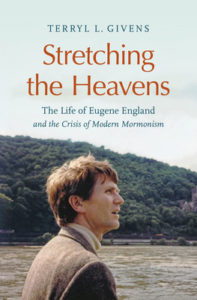 Terryl L. Givens, Stretching the Heavens: The Life of Eugene England and the Crisis of Modern Mormonism. University of North Carolina Press.
Terryl L. Givens, Stretching the Heavens: The Life of Eugene England and the Crisis of Modern Mormonism. University of North Carolina Press.
Eugene England was one of the most influential Latter-day Saint thinkers of the twentieth century—and in Stretching the Heavens, Terryl Givens shows us why. Readers who know England and those who do not will enjoy the story of England’s life and thinking, his debates with General Authorities, brilliant theological interventions, and ultimate exodus from BYU. Readers will also appreciate that Givens has written far more than a biography. Stretching the Heavens demonstrates persuasively that England is a microcosm of the development of modern Mormonism. The story of Eugene England is the story of a brilliant man whose thinking was ahead of its time. Walking through his life is walking through the era that formed the foundation of Mormon studies today, a task Givens accomplishes with style, depth, and nuance.
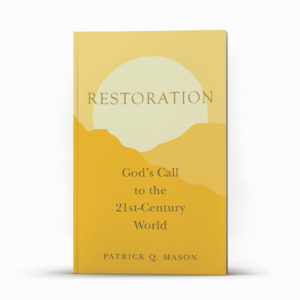 Patrick Q. Mason, The Restoration: God’s Call to the 21st Century World. Faith Matters.
Patrick Q. Mason, The Restoration: God’s Call to the 21st Century World. Faith Matters.
In a church that speaks of restoration regularly, Patrick Mason challenges readers to consider what they think restoration means—and what it should mean—personally, historically, and ecclesiastically. Mason’s insightful analysis of what restoration meant for 19th-century Saints may surprise readers, and while that surprise alone could engage readers’ attentions, Mason adds impeccable research, readable prose, and practical application. Mason has a keen ability to move easily from general philosophy to personal and practical applicability, from past to present, and from religious life to life in “the world.” As he treads both familiar and distant paths, Patrick Mason’s work effectively shows that restoration—the term, the movement, the thought—is critical to healing individuals, families, communities, and nations. By the end, readers will agree that the work of restoration is needed more than ever in our world today.
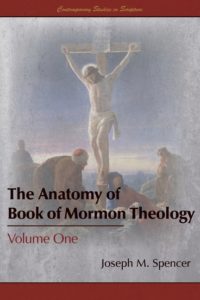 Joseph M. Spencer, The Anatomy of Book of Mormon Theology, Vols. 1 and 2. Greg Kofford Books
Joseph M. Spencer, The Anatomy of Book of Mormon Theology, Vols. 1 and 2. Greg Kofford Books
Joseph Spencer’s two-volume work on the Book of Mormon handily accomplishes its aims to collect and chronicle a decade of thoughtful Book of Mormon analysis while simultaneously telling the story of the developing field of Book of Mormon studies. Perhaps the foremost living Book of Mormon scholar, Spencer gleans insights that are brilliant. But more important than the insights, it is his holistic approach to scripture that may be life-changing. Without excuse, apology, or minimization, Spencer navigates the thorny debates about historicity, translation, and other potentially faith-diminishing considerations by moving beyond them and focusing on the words of the book. He targets the Book of Mormon with his philosophical training and his intense, close reading skills and finds that the book not only withstands academic scrutiny, it thrives. These volumes should conclusively debunk the myth that faith is solely a matter of heart. The essays could—and should—be read by those looking for insights about particular verses or stories. They also could—and should—be read by anyone who engages in the field of Book of Mormon studies. But more than either of those, Joseph Spencer’s The Anatomy of Book of Mormon Theology could—and should—be read by anyone who wants to bring their brain to the study of the Book of Mormon.
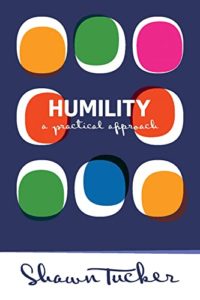 Shawn Tucker, Humility: A Practical Approach. BCC Press.
Shawn Tucker, Humility: A Practical Approach. BCC Press.
Shawn Tucker’s Humility is a thoughtful and readable meditation on this critical quality. A professor of Humanities at Elon University in North Carolina, Tucker combines both scriptural and diverse literary accounts to his far-reaching exploration of this critical quality. Though tailored for his religious audience, Tucker’s insights come from years of academic study, making his work widely applicable. He also carefully tailors the lessons he gathers from works of literature such as Shakespeare’s King Lear to an audience whose interest in humility may or may not include an interest in Shakespeare. With devotion, keen insight, academic training, and good humor, Shawn Tucker reimagines and revises one of the core concepts of the Book of Mormon, the pride cycle, as a cycle that not only depicts the negative consequences of pride but the positive rewards of answering events with an attitude of humility.
Award winner
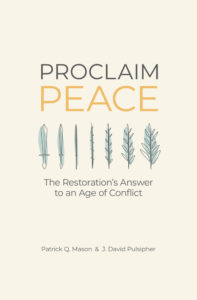 Patrick Q. Mason and J. David Pulsipher, Proclaim Peace: The Restoration’s Answer to an Age of Conflict. Maxwell Institute.
Patrick Q. Mason and J. David Pulsipher, Proclaim Peace: The Restoration’s Answer to an Age of Conflict. Maxwell Institute.
In an unprecedented gathering of insightful and well-written works of religious nonfiction, Patrick Q. Mason and J. David Pulsipher’s Proclaim Peace: The Restoration’s Answer to an Age of Conflict is a standout. The book speaks directly to our conflict-ridden world, is well-grounded in solid academic scholarship, solid logic, persuasive examples, and the best religious thinking on peace. Though co-authored, the work is both readable and philosophic, approachable by the lay member and the trained thinker. Disciples of the Prince of Peace will resonate with the goals of Proclaim Peace, and even readers who disagree will feel invited to join in meaningful conversation about violence in the modern world. That is perhaps one of the great accomplishments of this timely book: in an age when name-calling is a substitute for conversation, and fake news and sloganizing stand in the place of real dialogue, people who disagree just may join the ongoing discussion about violence. If they do, it will be because these authors’ goodwill and elegant style demonstrates respect for their audience, their topic, and their God. With generosity in perspective, humility in thought, and charity for readers, the authors of Proclaim Peace invite readers to communicate about the violence that has threatened the fabric of society since Cain slew Abel. The invitation is, itself, a demonstration. Patrick Mason and David Pulipher’s Proclaim Peace should be read for many reasons, but—at very least—it should be read for this one: these authors practice what they preach.

.
Thank you for writing this!